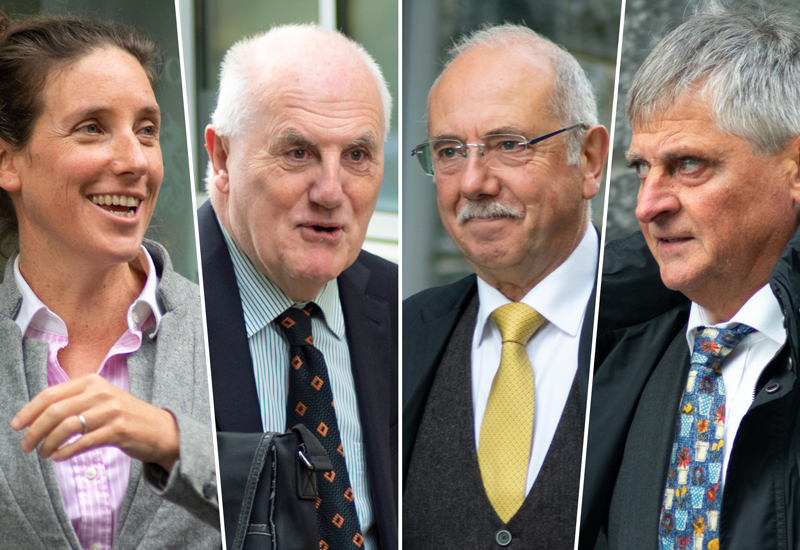


The Civil Contingencies Authority is confident it is striking the right balance between health and freedom as the Bailiwick faces hundreds of new covid-19 infections daily.
There are 1,839 people known to have covid-19 and therefore legally required to isolate or observe enhanced follow-up restrictions.
Another 386 cases were identified in the 24 hours between Wednesday afternoon and Thursday afternoon and there have been an average of 380 new cases a day since the weekend. It is estimated that the omicron variant now accounts for around nine in ten new infections.
Pictured: At the States' latest covid-19 public briefing, Dr Nicola Brink, Medical Officer of Health, shared this slide which breaks down the testing and vaccination status of known cases of covid-19 in the Bailiwick.
But the Chairman of the Authority, Deputy Peter Ferbrache, all but ruled out significantly tightening or loosening covid-19 rules for at least the next few days.
He said the Authority has “no plans at all” to reintroduce stricter border controls or go into a circuit-breaker lockdown.
He also said the Authority wanted to scrap mandatory isolation for people with covid-19 “hopefully in the not-too-distant future” but warned there was “still some way” to go before that.
“We’re continuing with what we currently have…for the time being,” said Deputy Ferbrache at the States’ latest covid-19 public briefing held on Thursday afternoon.
“We seek to balance the need to slow the spread of this new variant across our community with ensuring that any measures that are in place disrupt people’s lives as little as possible and are proportionate.
“The CCA met [on Wednesday]. It was a long meeting to review the latest data and advice from our senior professionals before concluding that at this stage, despite the rapidly increasing number of covid cases, we do not believe it is necessary or proportionate now to introduce further measures.
“But it’s very difficult striking the right balance. All members of the CCA are constantly aware that there are a wide range of views within the community. Probably now more so than at any other point during the pandemic.
“Quite simply, what we’re trying to do is to ensure that everybody is allowed to live their lives without being disrupted unless it’s reasonable and justifiable.”

Pictured: The Civil Contingencies Authority insists that its current course of action strikes a good balance between limiting the spread of the omicron variant of covid-19 and not placing disproportionate restrictions on freedom.
Despite hundreds of new infections daily, the number of people in hospital with covid-19 remains relatively stable. There are currently five – less than 0.3% of all cases – four of whom are in intensive care. On Wednesday, two patients were admitted and two were discharged. The Medical Officer of Health, Dr Nicola Brink, said the Bailiwick’s hospitalisation rate was lower than in the other Crown Dependencies.
Dr Brink also presented updated statistics which showed that covid-19 continues to fall disproportionately on people who have not had booster vaccines.
“The majority of the cases are occurring in unvaccinated, partially vaccinated or those who had a primary course of vaccine,” said Dr Brink.
“Another thing which has been quite striking to us within the team in public health is that people who are boosted are tending to have milder infections than people who have just had the primary course of vaccination or indeed those who are unvaccinated or partially vaccinated.
“We really are seeing the impact of the booster programme on clinical disease severity and that’s really encouraging.”
Dr Brink said that booster vaccines have now been given to 73% of eligible adults who completed a full course of the primary vaccines. She said this was “encouraging progress but we want to reach as close to that 100% target as we can”. She said the vaccine effort was “a phenomenal programme and people have worked incredibly hard”.
The Medical Director of the Princess Elizabeth Hospital, Dr Peter Rabey, said: “I think our vaccination status as an island is helping us enormously here. That is what is keeping us safe at the moment in terms of hospital numbers.”
Pictured: Dr Nicola Brink and Dr Peter Rabey said that relatively high take up of vaccinations was a key factor in the number of cases in hospital remaining relatively stable despite hundreds of new infections daily.
Deputy Ferbrache said that schools would reopen to students next Thursday as planned, but with some additional safety measures in place which are to be communicated to parents today, New Year's Eve.
Deputy Ferbrache wished the Bailiwick a happy New Year. He said 2022 would be a year which the Bailiwick would “enter with some difficulty but hopefully end with much optimism - and hopefully we’ll look back reflectively on a good year”.
Meanwhile, the States of Jersey yesterday announced two measures which were introduced in Guernsey a few days ago. They are changing the minimum isolation period for people with covid-19 from 10 days to seven days and they are asking direct contacts of positive cases to rely primarily on lateral flow tests rather than booking PCR tests.
Comments
Comments on this story express the views of the commentator only, not Bailiwick Publishing. We are unable to guarantee the accuracy of any of those comments.